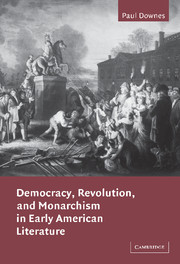Book contents
- Frontmatter
- Contents
- Preface
- Acknowledgments
- Introduction: the spell of democracy
- 1 Monarchophobia: reading the mock executions of 1776
- 2 Crèvecoeur's revolutionary loyalism
- 3 Citizen subjects: the memoirs of Stephen Burroughs and Benjamin Franklin
- 4 An epistemology of the ballot box: Brockden Brown's secrets
- 5 Luxury, effeminacy, corruption: Irving and the gender of democracy
- Afterword: the revolution's last word
- Notes
- Bibliography
- Index
Afterword: the revolution's last word
Published online by Cambridge University Press: 22 September 2009
- Frontmatter
- Contents
- Preface
- Acknowledgments
- Introduction: the spell of democracy
- 1 Monarchophobia: reading the mock executions of 1776
- 2 Crèvecoeur's revolutionary loyalism
- 3 Citizen subjects: the memoirs of Stephen Burroughs and Benjamin Franklin
- 4 An epistemology of the ballot box: Brockden Brown's secrets
- 5 Luxury, effeminacy, corruption: Irving and the gender of democracy
- Afterword: the revolution's last word
- Notes
- Bibliography
- Index
Summary
Thus, not only does democracy make every man forget his ancestors, but it hides his descendants and separates his contemporaries from him; it throws him back forever upon himself alone, and threatens in the end to confine him entirely within the solitude of his own heart.
(Alexis de Tocqueville, Democracy in America, 194)In recent years, the novels of James Fenimore Cooper have provided literary critics with useful examples of how an ideologically motivated refusal to think through the complexities of white, male subjectivity ends up contributing to a racist and proto-fascist aesthetic. This is an aesthetic, moreover, that is deemed to be entirely consistent with some of the ways in which Americans were trying to reimagine their national past and future in the wake of the war of 1812. “Cooper's fictions operate as strategies of containment,” writes Jonathan Arac, “imaginary techniques for negotiating the complexities of the life that both he and his readers were living” (“Establishing National Narrative,” 614). “Last of the Mohicans,” claims Dana Nelson, became a “culturally iconic text” because it “sidesteps the neurotic vantage of the son and assumes the more symbolically stable (if sterile) position of the father.” This move, she suggests, “complements the novel's misogynist obsession with racial purity” (National Manhood, 269–70).
- Type
- Chapter
- Information
- Publisher: Cambridge University PressPrint publication year: 2002

